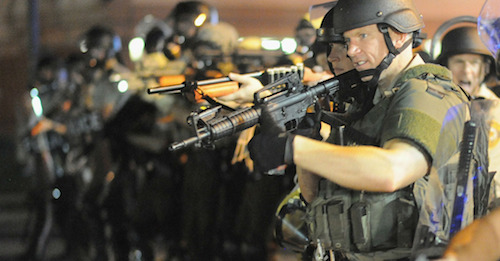Perhaps the most jarring element in the lede to this Times story about the militarization of local police departments is the appearance of “silencers” on the list of equipment the federal government gives to police. Obviously, cops need silencers so they can fire their guns without people knowing about it. They need body armor so that combat in the streets poses little threat to them, automatic rifles so they can spray a bunch of bullets in a short period of time, and mine-resistant trucks so they can make music videos. And we need something to do with surplus military equipment since 9/11.
As you will never forget, 9/11 was when terrorists destroyed the World Trade Center but did not change our way of life. Since then, we pursued simultaneous decade-long wars in Afghanistan and Iraq, which meant producing a bunch of military equipment. We also became extremely concerned about fighting terror in American cities, so the feds gave a lot of that equipment to local police departments. The final step in not changing our way of life was to decide that horrific attacks might happen at any time, so compliance with authorities became more important than our robust tradition of public protest.
Anyway, that’s what we did to ensure that the terrorists didn’t win and America stayed the same. Somehow, though, the practice of treating the police as “the frontline forces in a new war” backfired. Instead of securing our liberties, giving cops tanks and AR-15s and telling them that law enforcement was actually a war introduced some problems. In Ferguson, for example, when people took to the streets to complain about police brutality, they were driven indoors by what looked an awful lot like an army.
The US Army is not allowed to operate inside the United States, of course. That’s a cornerstone of our democracy, an invaluable check against government abuse. But when police with army equipment are fighting a war, it muddles the line between law enforcement and something else. That seemed particularly the case in Ferguson, where militarized police have not been enforcing the law so much as the peace.
In moments of domestic unrest, peace is indistinguishable from quiescence. This is an unpopular view—even an extreme one—but I don’t think the police should be able to easily quell public demonstrations. When the non-police people of Ferguson get angry because municipal authorities keep shooting them, those authorities should be afraid. They should not be able to exert military-grade force to assure that, before they discuss any changes, everyone shuts up and goes home.
As the Times points out, violent crime is lower than it has been in 20 years. Since 9/11, there have been exactly zero major terrorist attacks on American soil. Yet I do not think it is indefensible to claim that our consciousness of crime and terrorism—our perception that we are on the brink of disaster, from external enemies or internal unraveling—is recently at a high. As our society has become more orderly, we have become increasingly, even obsessively concerned about preserving order.
If you accept that premise, maybe now is not a good time to hand out assault rifles to cops. Crime statistics indicate that now is the best time in a generation to entrust Americans with the power to riot. Yet the demand for compliance has reached new heights.
I don’t think that reflects a conspiracy. I suspect the federal government armed police with military equipment because it had a bunch of military equipment. In the same way market forces pushed us toward those wars, the manufacturing economies of invading Iraq and Afghanistan have made the cops into a domestic army. But just because we’re not doing it on purpose doesn’t mean it isn’t happening.
The United States is sliding toward authoritarianism whether we mean to or not. Now is a good time to ask hard questions, and one of them is whether we want our police to wield insurmountable force. It’s tempting to offer them that force to use against terrorists, but so far they have only used it against us.
Related: who is included in “us?” A war demands an enemy. When we tell our police that we’re giving them assault rifles and silencers so they can fight a war, the enemy becomes the people they meet while doing their jobs. On the streets, the enemy becomes anyone who is not a cop, anyone who does not have body armor and a gun. We’ve declared war on terror and assembled an army of police that never meets any foreign terrorists. Whom do we expect them to go to war against?





Silencers aren’t all bad. They’re essential if you want to fire your weapon in someone’s house or place of business and protect your hearing. It’s important that police who are shooting at civilians don’t damage their hearing.
http://tgace.com/2014/08/25/tanks-on-american-streets/